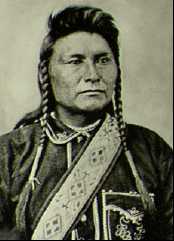By Davi Napoleon
Barton, a documentary filmmaker who had studied playwriting at Yale, gave me the play to read, and I knew why it attracted the producers. Thematically and theatrically large, with fights, chants and dances, the play told the story of the wrenching compromises Joseph had to make and his determination to keep the struggle for Native American rights alive.
You’d have thought everyone in the Native American community would have been thrilled to see this show go up. You would have thought wrong.
Chelsea asked Charles Haid to direct. Haid was an actor and director for the TV series Hill Street Blues and Barton’s friend. He cast the show with the best actors available, many of them non-white, none of them Native American.
Members of the Native American Theater Ensemble (NATE) became enraged. Didn’t they have the right to play the roles in a play that depicted their culture? If Chelsea did not recast, NATE would do what they had to do to close it—sit in, perhaps, or picket.
Chelsea was not a political theater. “This time, because they knew they would be protested against, they were put in a position where they had to take a political stand,” said Dale Soules, who was to appear in the show.
Barton did not attempt to describe American Indian life realistically. His characters leapt through time and space, confronting their former selves. Film sequences were to extend and comment on the action. The language was poetic, stylized, capturing the rhythm of the runners.
But if Barton was exploring his own culture or universal themes, NATE wanted to know why he was “using” their culture as a metaphor. “They didn’t know the first thing about us. The characters didn’t speak the way we speak…but we could have fixed the script, because the play said some very good things about us,” said NATE performer Jane Lind.
Chelsea dropped the play. Several months later, NATE lost its state funding, moved to Oklahoma, and soon folded. Barton tried to get funding to produce his play himself, without success. To the best of my knowledge, Peter Barton never wrote another play, and it is a huge loss.
Forget about Native acting stars such as Graham Greene, Wes Studi, and Tantoo Cardinal. The implication is that even they aren't qualified to play Native parts. Non-Native actors can do the job better.
Play misrepresented Natives
Napoleon's account is dripping with disdain for Natives. Let's examine a few points:
Isn't this the perfect rationale for hiring Native actors? If you received this kind of criticism, wouldn't you take it to heart? Or would you continue to assert that you knew how to portray Natives?
The Native response blows Haid's claim about casting the "best" actors out of the water. They may have been best at selling tickets or kissing up to Haid, but they weren't best at playing Natives. We know this because Native theater professionals said so. Haid's "best" choices were a joke to actual Natives.
Why is Napoleon defending the creative types who were ignorant about Indians and planned to misrepresent them? Did she really want them to turn the esteemed Chief Joseph into a phony caricature? Thanks for trying to "honor" us, the Natives probably thought, but no thanks.
Natives try, non-Natives don't
Why didn't Barton and Haid work with them to produce a better play? Why does Napoleon blame the Natives for the theater's intransigence? If Barton and Haid were too arrogant, stubborn, or cowardly to admit they were wrong, whose fault is that?
As for the implication that the incident ruined Barton's career, it's not the critics' job to protect the playwright's fragile ego. If Barton wanted to write about Natives, he should've expected them to respond. In fact, he should've openly and eagerly sought their input.
If he seriously thought Natives would give him a free pass on a play written about them, he was incredibly naive. He was too naive to be working in a rough-and-tumble business like the theater. He's better off being a ditchdigger or whatever where few people will criticize his work.
Conclusion
I don't know when the incident happened, but Napoleon posted the item October 14. The implication is that this is an example of political correctness run amok. And that this attitude still plagues the industry today.
Yes, the racist attitude that whites are superior to minorities, that whites know best, does plague the industry today. So does the racist attitude that minorities who protest this racist attitude are crybabies. If blacks criticized a remake of Birth of a Nation, she'd attack them too.
The only crybaby I see here is Napoleon. A Native group successfully shut down a play that misrepresented them and she doesn't like it. She insists upon the artists' "creative license" to say and do what they want, even if it's racist or stereotypical.
For more on the subject, see Friday, Tonto, Jacob Black, et al. and Native Plays and Other Stage Shows.
Below: An "artistic interpretation" of Chief Joseph?



4 comments:
I can think of at least one top Native actor of Nez Perce heritage with ample theatre experience who lives in New York. But then the reason Natives were not cast is not a lack of qualified Native actors. The real goal - as with so much casting of Native roles recently - is to pay lip service to the historical record about Indigenous issues without having to engage with contemporary Indigenous reality on any level. If we falsely "Indigenize" mainstream story telling we are able to create an illusion of depth and Indigenous "representation" and may dispense with the need for Native actors, Native story telling and the acknowledgment of Native peoples altogether.
Linde Knighton's response to this item on Facebook:
I wanted to give you an example of a theatre that did it right. "Wonderful Town," features a song written in the 1950s which uses the S word. When informed a Native problems with this, David Armstrong, Executive Director of the %th Avenue Theatre, in Seattle, quietly changed the lyrics to remove the offensive word, and no one noticed other than the Natives.
http://www.starbulletin.com/news/20091016_princess_sparks_heated_debate.html
Only somewhat related (I didn't know where else to put this) is an article in the Honolulu Star Bulletin. Q'orianka Kilcher in a movie playing a Hawaiian. The controversy is about the title, Barbarian Princess. I'd be interested in any reactions.
You can e-mail news items to me, Kevin. But thanks for the heads-up. I hadn't seen this item. I posted something about it in Hawaiians Criticize "Barbarian" Movie.
Post a Comment